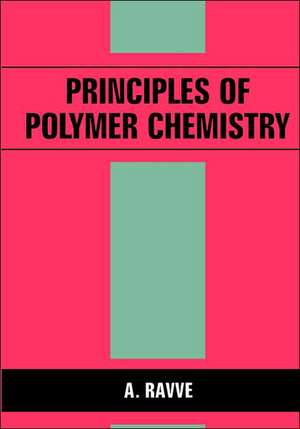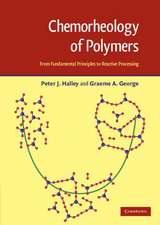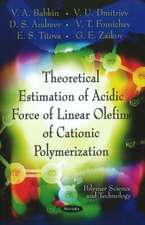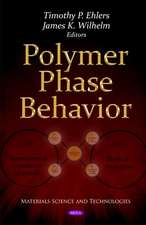Principles of Polymer Chemistry
Autor A. Ravveen Limba Engleză Hardback – 31 mar 1995
| Toate formatele și edițiile | Preț | Express |
|---|---|---|
| Paperback (1) | 732.02 lei 6-8 săpt. | |
| Springer – 23 aug 2016 | 732.02 lei 6-8 săpt. | |
| Hardback (2) | 671.79 lei 6-8 săpt. | |
| Springer Us – 31 mar 1995 | 671.79 lei 6-8 săpt. | |
| Springer – 23 mai 2012 | 986.50 lei 6-8 săpt. |
Preț: 671.79 lei
Preț vechi: 790.35 lei
-15% Nou
Puncte Express: 1008
Preț estimativ în valută:
128.55€ • 134.55$ • 106.99£
128.55€ • 134.55$ • 106.99£
Carte tipărită la comandă
Livrare economică 31 martie-14 aprilie
Preluare comenzi: 021 569.72.76
Specificații
ISBN-13: 9780306448737
ISBN-10: 0306448734
Pagini: 496
Ilustrații: XIV, 496 p.
Dimensiuni: 178 x 254 x 35 mm
Greutate: 1.29 kg
Ediția:1995
Editura: Springer Us
Colecția Springer
Locul publicării:New York, NY, United States
ISBN-10: 0306448734
Pagini: 496
Ilustrații: XIV, 496 p.
Dimensiuni: 178 x 254 x 35 mm
Greutate: 1.29 kg
Ediția:1995
Editura: Springer Us
Colecția Springer
Locul publicării:New York, NY, United States
Public țintă
ResearchCuprins
1. Introduction.- 2. Free-Radical Chain-Growth Polymerization.- 3. Ionic Chain-Growth Polymerization.- 4. Ring-Opening Polymerizations.- 5. Common Chain-Growth Polymers.- 6. Step-Growth Polymerization and Step-Growth Polymers.- 7. Naturally Occurring Polymers.- 8. Reactions of Polymers.
Notă biografică
A. Ravve received his Ph.D. in Chemistry from the University of Utah in 1950, and was Post Doctoral Fellow at both the University of Michigan (1950-1951) and Iowa State University (1951-1952). He worked for 28 years with Continental Group, Incorporated, mainly as a Research Manager, and subsequently as Senior Consultant in syntheses and utilization of polymeric materials. He also taught evening courses in polymer chemistry at several institutions of higher learning in the Chicago area, from 1960-1991. Currently he does consulting in polymer chemistry.
Textul de pe ultima copertă
This successful textbook undergoes a change of character in the third edition. Where earlier editions covered organic polymer chemistry, the third edition covers both physical and organic chemistry. Thus kinetics and thermodynamics of polymerization reactions are discussed.
This textbook also covers such hot topics as photonic polymers, electricity conducting polymers, polymeric materials for immobilization of reagents and drug release, organic solar cells, and organic light emitting diodes.
This textbook contains review questions at the end of every chaper, references for further reading, and numerous examples of commerically important processes.
This textbook also covers such hot topics as photonic polymers, electricity conducting polymers, polymeric materials for immobilization of reagents and drug release, organic solar cells, and organic light emitting diodes.
This textbook contains review questions at the end of every chaper, references for further reading, and numerous examples of commerically important processes.
Caracteristici
New material on the chemistry of polymeric materials for special applications. These subjects are currently of considerable interest in industry and academia Only Polymer textbook that combines Organic and Physical Chemistry. Thus, for instance, in each chapter that deals with polymer preparations, both the kinetics and the thermodynamics of the reactions are discussed All figures are updated in this edition Physical properties of polymers are expanded and placed into a separate chapter and include such subjects as elasticity and rheology of polymers as well as a thorough discussion of the transition temperatures. This is done to accommodate students who do not receive a separate course on physical properties of polymers










